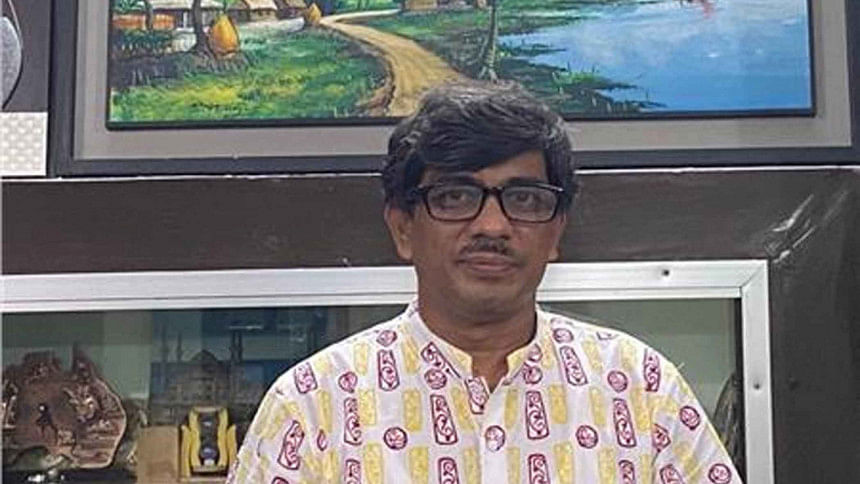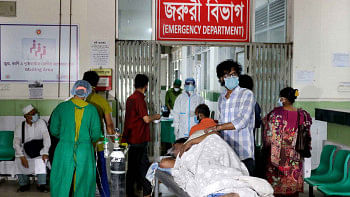‘To properly utilise health budget, we need a system overhaul’

Dr Syed Abdul Hamid, professor at the Institute of Health Economics in Dhaka University, speaks with Naznin Tithi of The Daily Star about the allocation for the health sector in the proposed national budget, and how to efficiently utilise this allocation.
What do you think about the allocation for the health sector in the proposed budget? Why is the allocation in this sector so low, despite it being one of the most important sectors where improvement is needed?
In the proposed budget, around Tk 36,864 crore or 5.4 percent of the total budget has been earmarked for the health sector. This is not a great amount. But compared to the rate at which we utilise the allocated funds, this is not a bad amount either. We can, of course, demand a bigger allocation for the sector, but only if the disbursed allocation is utilised in a qualitative and efficient way. Every year, a major part of the allocation remains unutilised due to the weaknesses and flaws in the system. If the health ministry and the relevant government agencies can address these flaws, they can demand increased allocations.
There is no novelty in the budget other than the expansion of maternal health voucher scheme in some upazilas. The overall budget has increased by 14.24 percent, while the health budget has increased by 12.62 percent. The incremental costs and inflation will basically eat up the growth of the allocation.
There are two sides of a budget: operational budget and development budget. If we look at the last five national budgets, we will see that about 20-30 percent of the operational budget and 30-40 percent of the development budget remained unutilised in a fiscal year.
What are the weaknesses in the system that you mentioned earlier? Why does the budgetary allocation remain unutilised?
There are various cost centres under the health ministry that prepare their own budgets and send them to the ministry. All the district and upazila hospitals, health complexes and offices send their yearly budgets to the ministry through the Directorate General of Health Services (DGHS). The government medical colleges and specialised institutes and hospitals – such as the cancer hospital, kidney hospital, etc – also send their estimated budgets to the ministry. Then the health ministry has at least 32 operation plans (OP), whose budgets they determine themselves. In addition, the health ministry takes up some big projects, such as building new medical colleges or hospitals. So, the finance ministry decides the budgetary allocation as per all the health authorities' estimated expenditures. If they do not have new plans and projects, how will they get an increased budget?
In our upazila health complexes, there are 21 posts of doctors and junior consultants in each of them. But if you go there, you will hardly find seven or eight doctors. This is because there are 11 positions of junior consultants, which always remain vacant. Then there are also many vacant posts of cleaners, medical technologists and drivers. We need to recruit manpower in these positions to provide quality healthcare to people. But that is not done, so the budget remains unutilised.
Currently, the government allocates Tk 1-1.5 crore for buying medicines in every upazila. Although the upazila authorities buy the medicines, they cannot provide the patients with the necessary medicines because of a basic flaw in the system: there are no modern storage facilities in the upazilas to store medicines, nor are there any storekeepers. It is often seen that the medicines in stock are unutilised and get expired because of the flawed dispensing mechanism. What is missing here is the lack of accountability in failing to provide the people with the services they need. In many cases, the responsible people in the health complexes experience difficulties in buying the medicines because, coming from the medical background, they often find the system of procurement pretty difficult.
It is the duty of the health ministry to find out these problems and resolve them. If the health ministry can find the places where development is needed, then they could ask the finance ministry for the funds. But the health ministry does not have the efficiency, capacity or willingness to do so.
What are the problems with procurement that the health authorities often face?
We cannot spend the allocation for procurement efficiently mostly because it takes a lot of time to get the files for procurement approved by the relevant ministries. Then the line directors for the OPs, the programme officers and deputy programmes officers – who are medical professionals – do not have adequate knowledge about procurement. So, despite having crores of taka as funds for procurement, they cannot use it. What they basically do is depend on their accountants or statisticians or staff who have been working there for a long time. These staff are often connected with local syndicates and involved in corruption.
How do you think the system can be fixed?
There are some institutional problems that need to be addressed urgently. The health ministry needs approval from the apex government bodies, such as the public administration ministry, planning ministry, the Planning Commission and the finance ministry, for undertaking any new project, procurement and appointing manpower. If the ministry can better negotiate with other ministries, then it can get its projects passed in a short time and apply for more funds.
Another major problem is that those who work at the secretariat come from the administration cadre, who do not have much idea about the medical profession and the health sector. And those who work at the DGHS are mostly doctors without any training for administrative work. But what we need is a combination of both. In the current system, when an important file from the DGHS goes to the ministry for approval, the ministry delays it because they hardly understand the importance of the matter. So, a lot of time is wasted to approve a new project or plan.
If we could make a new stream under the BCS medical cadre, who will be dedicated to health administration from the beginning of their careers, much of the problem could be solved. Those who will go to the administration cadre will be prepared with managerial skills, but will also have medical knowledge. If that can be done, the unnecessary waste of time at different government offices to get the important projects approved can be stopped.
In addition, the organograms of the different institutions must be changed and modernised – particularly the upazila health complex organogram. The health ministry must do this with cooperation from the public administration ministry.
And a small development in medicine procurement can change the situation in the upazila health complexes. We need to set up a modern storage facility and a medical storekeeper to keep track of the medicines in stock, using digital technology. The expiry dates of the medicines can be tracked by using colour codes: for example, medicines that would expire in six months can be kept under the yellow section, and those that will expire in a year can be kept under the green section, and the medicines that must be used as soon as possible should be kept under the red section. That way, no medicine will go to waste. Is that too difficult to implement? If we can make this small change and invest here, then the funds can be spent in a qualitative way.
In the last two years of the pandemic, we saw how weak our healthcare system is, and where improvement is needed. Is there any reflection of that lesson in the proposed budget?
The Covid-19 pandemic has opened our eyes. It has shown us that nothing is as important as our health. The pandemic has exposed the weaknesses and pitfalls of our health sector. Although during the two years of the pandemic we took some ad hoc measures to improve the healthcare services, we got back to our business-as-usual attitude as the pandemic waned.
What we realised during the pandemic was that the preventive care of our health service had been totally ignored – the government struggled to make people wear masks or maintain social distance. Besides establishing a good immunisation programme, we couldn't make much progress there. Preventive care means that we need to educate people about health safety, which is a continuous process: we need to educate them about the importance of safe air, safe food, safe water, and a safe environment. But we don't seem to have any plan at work to improve our preventive care. So, naturally, there is no allocation for this in the budget.
We have told this time and again during the pandemic, but nothing has changed. For example, we have an office for preventive care at the upazila level. But there is not enough manpower to run those offices. This needs to change.
How can we utilise the full budgetary allocation in the health sector and increase the budget?
Usually, the funds in the health sector are disbursed in four instalments. While the first two instalments are released very quickly, the last two instalments are disbursed very late. The last instalment is given in late May or early June, and all the procurement and purchases have to be finished by June 14. So, in most cases, the money disbursed in the last instalment cannot be properly utilised due to time constraint. If the last instalment can be disbursed in April, then the managers at upazila level have enough time to utilise the funds following proper procedures – floating tenders, selecting vendors, etc.
Then there should be provisions for emergency funds in our health budget. Say, for example, if the district hospitals are annually given Tk 10-20 lakh and the upazila hospitals are given Tk 5 lakh as emergency funds, we will need only Tk 37 crore. With this money, the hospitals can meet their emergency needs such as repairing machinery or making emergency purchases. This will not only improve the quality of the service provided, but will also ensure that the fund is utilised properly.
Then, if the vacant posts in the government hospitals can be filled by recruiting manpower, they can ask for more allocations. If we can ensure proper utilisation, we can get two-three times more benefits from the same budget. But for that, we need to completely overhaul the system.

 For all latest news, follow The Daily Star's Google News channel.
For all latest news, follow The Daily Star's Google News channel. 











Comments